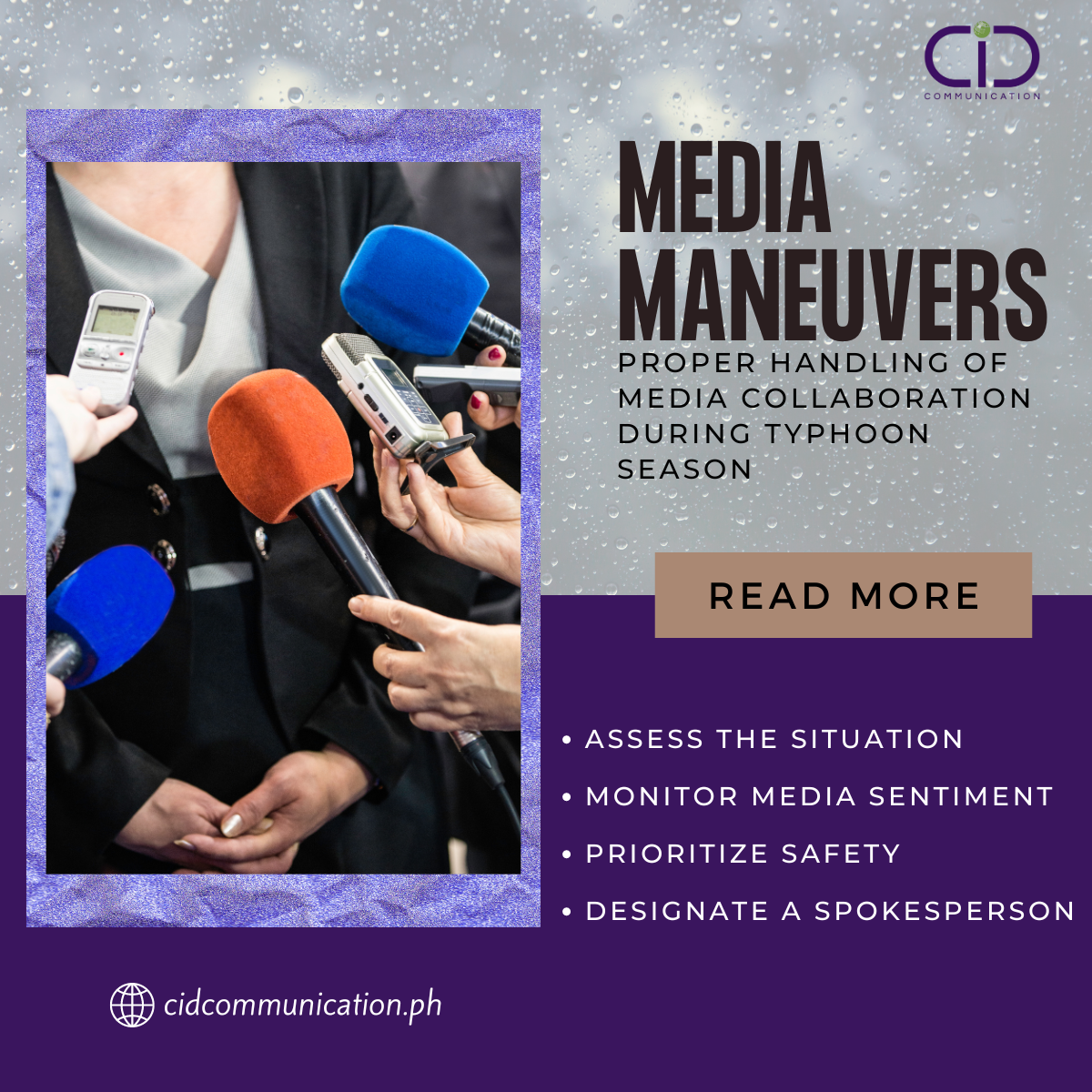While some might see the rainy season as the perfect bed weather, in the Philippines, wet monsoon brings a different reality. Weather disturbances have become increasingly classified as super typhoons that when a storm hits, people are always busy raising their belongings or, in the worst cases, evacuating to safety.
The recent typhoon Carina intensified into a super typhoon and caused significant damage in the Philippines. Carina did not make landfall in the Philippines but enhanced the southwest monsoon, leading to heavy rains and widespread flooding, resulting in at least 13 fatalities and displacing over 600,000 people. The agricultural sector has suffered losses exceeding PHP 1.17 billion, and many areas, including Metro Manila, have been declared under a state of calamity due to the severe flooding.
Despite the uncertainties we Filipinos face, especially in the working sectors, we continue to adapt and strive for a better life.
Our commitment to Public Relations goes beyond merely managing our clients’ public image. Building and maintaining authentic connections with journalists, editors, and other media personnel through CID’s Media Relations team is crucial to our success. These relationships are the cornerstone of effective PR, enabling us to secure valuable coverage, manage crises, and ensure our clients’ messages are communicated accurately and compellingly.
To maintain and nurture these vital connections, we must invest time and effort into understanding the needs and preferences of media personnel. This involves having regular communication, providing timely and relevant information, and showing genuine appreciation for their work. Especially in times of calamity, such as media collaboration during a typhoon, it is important to support and acknowledge their efforts.
Managing media invitations during a calamity requires careful consideration and utmost sensitivity. CID Communication has outlined key steps to help navigate this challenging situation effectively.
Assess the Situation
First and foremost, it is crucial to understand the severity of the calamity and its impact on the community. This involves assessing the extent of the damage, the number of people affected, and the ongoing risks. By gaining a comprehensive understanding of the situation, you can make an informed decision about whether it is appropriate to proceed with the event or if it would be more respectful and practical to postpone it.

For instance, CID Communication frequently collaborates with our clients to co-organize events that require the presence of media. When heavy rainstorms force us to postpone these events, CID’s primary concern is the safety and well-being of all participants. In such cases, we typically recommend rescheduling the event to a later date or transitioning to a virtual format to avoid any risks associated with adverse weather conditions.
Monitor Media Sentiment
It’s important to stay attuned to community reactions and be ready to modify your media invitation plans as needed. This means actively monitoring feedback and sentiment from the community and being willing to make adjustments to address any concerns or issues that arise. Flexibility and responsiveness are key in ensuring that your approach aligns with the community’s needs and expectations.
CID promptly arranges a meeting with our client to discuss all possible options and recommendations. During this meeting, we carefully evaluate the situation, considering factors such as the bad weather, the availability of key participants, and the technical feasibility of a virtual event. Once a decision is reached, we communicate the updated plan to our team, ensuring that everyone is informed and prepared for the new arrangements.

These considerations are equally important when sending out press releases. When the Media Relations team distributes press releases to media personnel, it is crucial to show sensitivity and respect for those affected by the calamity. Communication should be conducted with empathy and understanding, acknowledging the impact our messages can have on individuals and the broader community. By being adaptable and attentive, you can foster a positive relationship with the media and demonstrate your commitment to their well-being and interest.
Prioritize Safety
To ensure the safety of both media personnel and affected individuals, it is pivotal to exercise caution when granting media access to certain areas. Specifically, avoid inviting media to locations that are still dangerous or unstable. This precaution helps prevent potential harm to journalists and other media staff, while also safeguarding those who have already been affected by the situation. By prioritizing safety and stability, we can ensure that media coverage, such as media collaboration during a typhoon, is conducted responsibly and without adding risk to anyone involved.

There have been instances when CID demonstrated a commitment to support and empathy by having “care packages” delivered to the media (on behalf of our client) to ensure they stay safe. These packages served as a token of appreciation for their understanding, helping maintain positive relationships and reinforcing our client's reputation as a considerate and responsive organization.
Designate a Spokesperson
To effectively manage media inquiries and ensure consistent messaging, it is essential to appoint a spokesperson who is both knowledgeable and empathetic. This individual should possess a deep understanding of the subject matter and be able to communicate complex information clearly and accurately. Additionally, their empathetic nature will enable them to address sensitive issues with compassion and understanding.

The Media Relations team of CID serves as our dedicated spokespersons, ensuring a unified message to minimize misinformation and handle all communications professionally. This not only enhances our organization's credibility but also fosters trust among stakeholders.
By thoroughly evaluating various aspects, a well-informed decision that prioritizes the well-being and needs of the community can be made. This approach demonstrates sensitivity and respect for those affected by the calamity.
CID Communication is committed to ensuring that our actions reflect our dedication to supporting and uplifting our community during these challenging times. Our proactive engagement and careful consideration are vital in making a positive impact. Let’s move forward with empathy and responsibility. Talk with us at <cidcommunication.ph>, Facebook, or LinkedIn.



